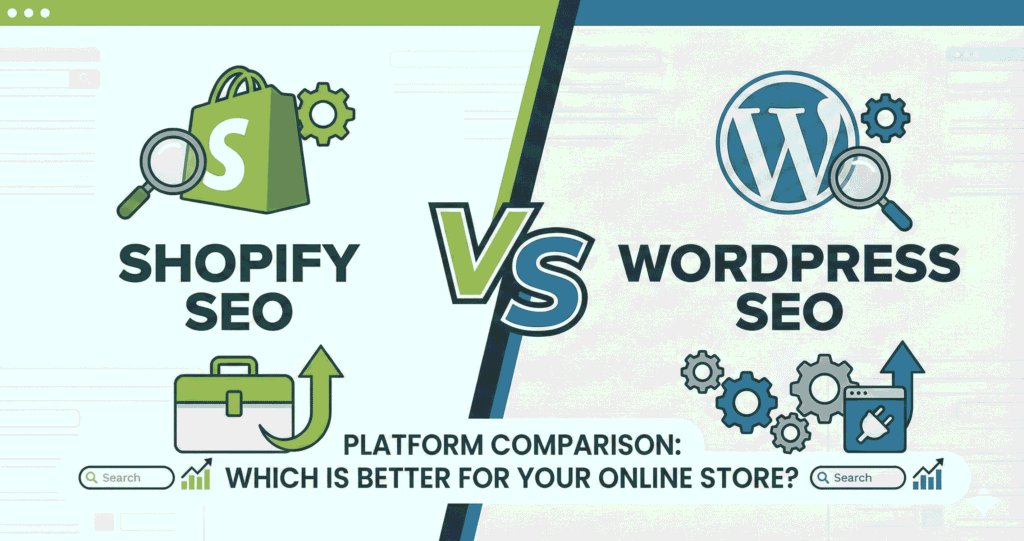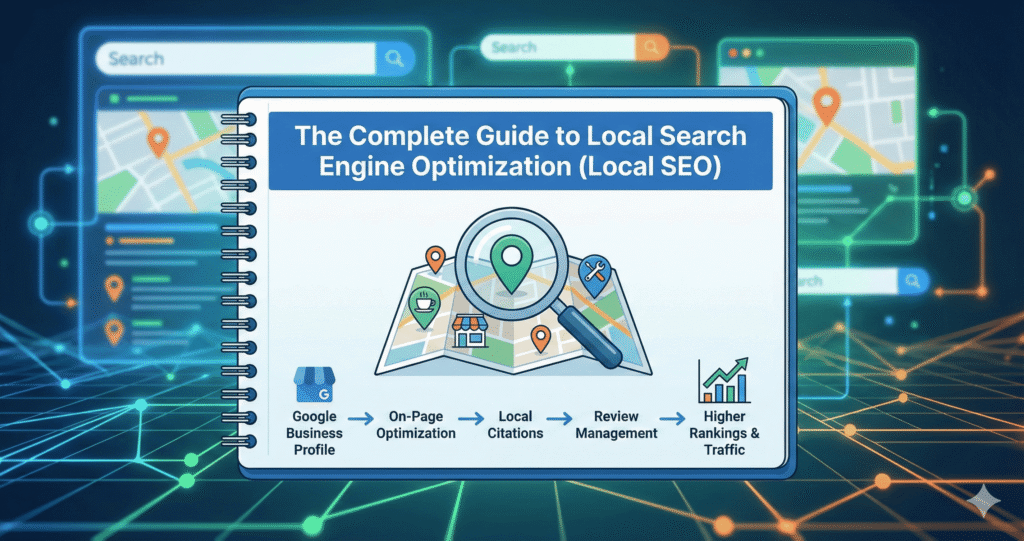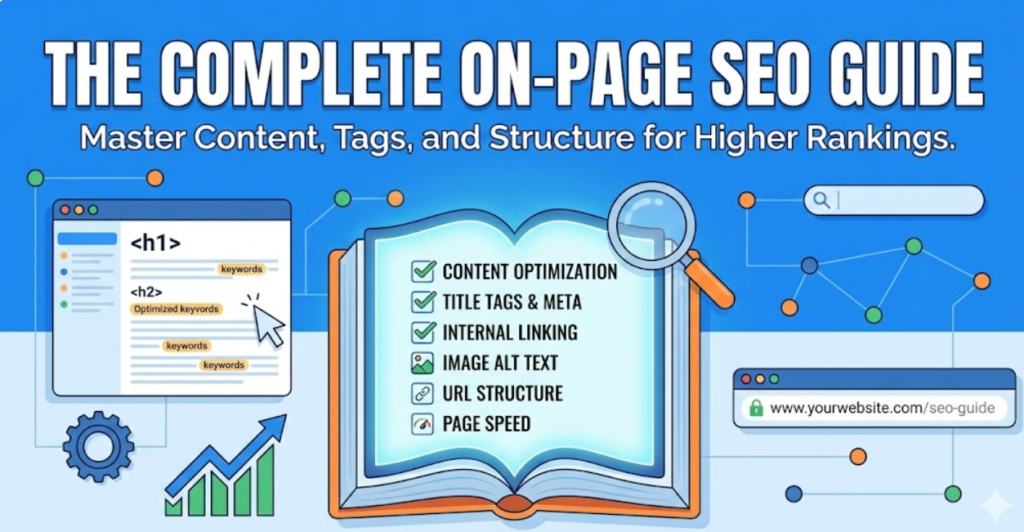Shopify SEO is easier for beginners; everything’s built in and managed for you. On the other hand, WordPress SEO gives deeper control, flexibility, and room for advanced optimization.
If you’re struggling to decide which platform fits your business goals, our team of SEO experts at Cloudex Marketing can guide you toward the best SEO setup for lasting growth and visibility.
So, which one’s better?
Well, it depends on your goals and how much control you want over your site’s SEO. Shopify simplifies the process, while WordPress lets you fine-tune every detail.
If you’re unsure which suits your business best, keep reading! This guide has the solution for you. It breaks down each factor that actually affects your rankings, traffic, and long-term growth.
What Is Shopify SEO
Shopify is the easiest globally used hosted e-commerce platform. It helps businesses create and manage online stores to sell products online. When it comes to Shopify SEO, it means optimising your online store that’s built on Shopify. Everything from your website’s speed to its structure is handled by Shopify itself, so you don’t need to manage hosting, coding, or updates manually.
Shopify SEO helps your products and pages show up on search engines like Google when people search for what you sell. It covers things like editing page titles, adding meta descriptions, optimising product images, and improving internal linking.
Because Shopify is a “closed-source SaaS platform”, you get less technical freedom but much easier management. It’s perfect for those who want SEO done without dealing with complex tools or backend setup.
What is WordPress SEO
WordPress is one of the best open-source content management systems (CMS) with over 472 million users worldwide. WordPress SEO refers to optimising websites built on WordPress. When you add the WooCommerce plugin, it turns into a complete e-commerce setup, giving you full control over every SEO element.
WordPress SEO refers to optimising websites built on WordPress. Businesses that use WordPress can achieve exceptional search visibility with our WordPress SEO optimization services, giving you complete control over technical and on-page SEO settings.
Unlike Shopify, WordPress is self-hosted, which means you choose your own hosting provider, manage your site’s files, and control every technical aspect. That’s why WordPress SEO allows more flexibility, from installing advanced plugins like Yoast SEO or Rank Math to customising URLs, site speed, and schema markup.
It takes a bit more effort to set up and maintain, but for businesses that want deeper SEO control, WordPress offers the best power and scalability.
Shopify SEO vs. WordPress SEO: A Side-by-side Comparison
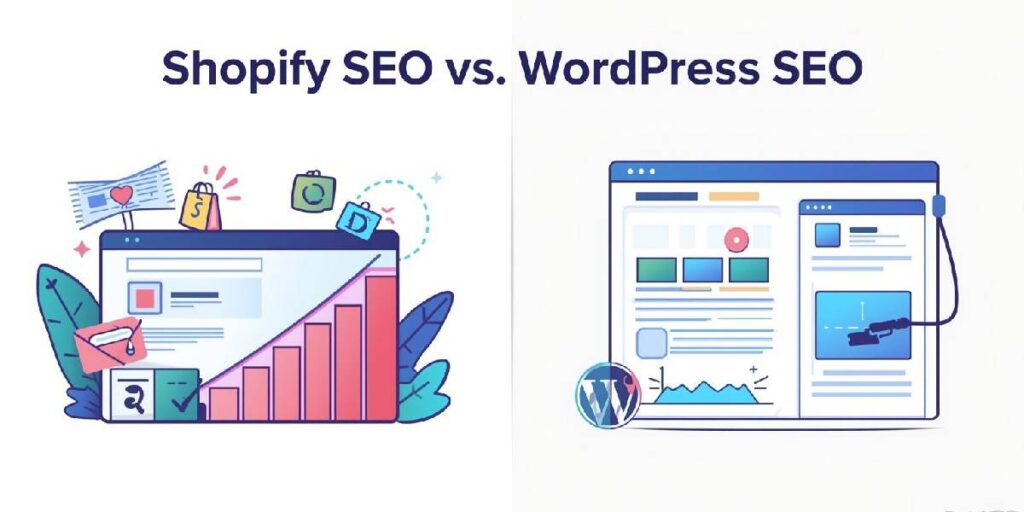
Whether it’s Shopify or WordPress, each platform has its own way of handling SEO. Some factors affect your visibility directly (like speed and content), while others affect how much control or freedom you have to make technical changes.
Below is a quick side-by-side comparison of the main SEO factors that matter most in both these platforms. These comparisons will help you decide which platform aligns better with your goals, technical comfort, and business type.
| SEO Factor | Shopify | WordPress |
| Customization & Control | Limited control since Shopify manages hosting and structure | Full control over every SEO and site element |
| Cost | Need to purchase monthly subscriptions. | Free! except for some themes and plugins. |
| Ease of Use / Learning Curve | Beginner-friendly, minimal setup needed | Steeper learning curve, requires setup and maintenance |
| Speed & Performance | Fast due to Shopify’s optimized servers | Depends on hosting quality and theme setup |
| Technical SEO Access | Basic settings available; limited server access | Complete access to code, files, and advanced SEO settings |
| URL & Permalink Control | Restricted structure, can’t fully customize URLs | Full customization possible for clean and keyword-rich URLs |
| Plugins / Apps & Extensions | Fewer SEO apps, mostly paid | Thousands of free and paid SEO plugins |
| Hosting & Infrastructure | Managed hosting by Shopify (secure and reliable) | Self-hosted, flexibility to choose your own hosting provider |
| Security & Updates | Automatically managed by Shopify | Manual responsibility (plugins, themes, WordPress core) |
| Content / Blogging Capabilities | Decent but basic blogging features | Advanced blogging options with full formatting control |
| Scalability & Future Growth | Great for small to medium e-commerce stores | Ideal for scaling into larger sites with complex SEO needs |
Here’s a closer & detailed look at how Shopify and WordPress perform across key SEO areas. What each factor means, how both platforms handle it, and where the trade-offs lie.
1. Customization & Control
Customization defines how much you can tweak your website’s structure, meta tags, code, and design, all of which affect SEO. Shopify is simpler but less flexible. WordPress gives full control but needs technical knowledge.
Let’s See how:
Shopify:
Gives you ready-made themes and templates with limited backend control. You can edit titles, descriptions, and image alt text, but you can’t fully access server files or modify core elements.
WordPress:
Offers complete freedom. You can edit everything, from site architecture to schema markup. Developers and SEO experts can build fully customized structures for better search performance.
2. Cost
Shopify:
Shopify has monthly subscription plans starting at around $19 USD/month for the Basic plan for normal-scale businesses, going up to higher tiers such as $2,300 USD/month for the Plus plan for large-scale businesses.
Shopify gives you convenience: less technical maintenance, automatic updates, built-in hosting, and security. That means less worry but higher cost.
WordPress:
WordPress itself (the CMS plus WooCommerce plugin) is completely free. There’s no monthly platform fee for self-hosted WordPress + WooCommerce websites. However, you’ll still need to pay for web hosting, domain registration, an SSL certificate, and occasionally premium themes, plugins, or developer support.
Good managed WordPress hosting plans generally start from $3 – $10 USD per month for basic packages, depending on features such as storage, bandwidth, and customer support.
WordPress gives you flexibility: lower basic costs possible, more control, can choose cheaper or premium hosting depending on the performance needed. But you’ll spend more time (or money) managing hosting, security, updates, and compatibility of plugins/themes.
3. Ease of Use / Learning Curve
Easy of use or learning curve of Shopify and WordPress means how easy it is to manage SEO tasks without needing deep technical skills. Shopify saves time; WordPress rewards patience and technical confidence.
Shopify:
User-friendly and built for beginners. All core SEO tools are available inside the dashboard — easy to edit, track, and maintain.
WordPress:
Has a steeper learning curve. You’ll need to install and configure plugins (like Yoast or Rank Math) and manage hosting setups.
4. Speed & Performance
Website speed directly affects rankings and user experience. If your site needs improved load times and smoother navigation, our website development services ensure fast, responsive, and SEO-optimized websites that users and Google love.
Here’s how:
Shopify:
Runs on fast, global servers optimized for e-commerce performance. You don’t need to worry about caching or CDN. It’s handled automatically.
WordPress:
Speed depends entirely on hosting quality, plugins, and theme optimization. A poorly managed site can slow down easily.
5. Technical SEO Access
It is the ability to optimize advanced SEO elements like robots.txt, sitemaps, redirects, and structured data. If you want to strengthen your site’s structure and indexing efficiency, our technical SEO experts can handle everything from structured data to crawlability enhancements.
Shopify:
You can edit basic settings, but access to files like robots.txt and .htaccess is limited. Some edits require apps or developer help.
WordPress:
Full access to all technical settings and files. You can configure everything manually or with powerful plugins.
6. URL & Permalink Control
Clean, keyword-focused URLs help Google understand your site better. Here, Shopify URLs are fixed; WordPress URLs are fully customizable.
Shopify:
Automatically adds words like “/collections/” or “/products/” to URLs, which can’t be removed, slightly reducing flexibility.
WordPress:
Complete freedom to structure URLs however you want. You can make them short, descriptive, and keyword-rich.
7. Plugins / Apps & Extensions
Plugins or Apps, and Extensions are tools that extend your SEO capabilities and automation. In this case, Shopify is cleaner but limited. WordPress gives you variety, with more responsibility to manage updates.
Shopify:
Has a smaller app ecosystem focused mainly on e-commerce SEO (many are paid). You’ll find apps for image optimization, redirects, and analytics.
WordPress:
Thousands of free and premium plugins available for every SEO task imaginable. Popular ones like Yoast SEO and Rank Math simplify advanced settings.
8. Hosting & Infrastructure
Hosting affects speed, uptime, and how Google crawls your site. In this area, Shopify is worry-free. WordPress gives control to pick and use your own hosting provider, puting the responsibility of managing it on you.
Shopify:
Comes with fully managed hosting, secure, fast, and hassle-free. No setup or maintenance required.
WordPress:
You choose your hosting provider either Bluehost, Hostinger, HostGator, GoDaddy, or other, which affects site speed and reliability. Quality hosts make a big difference here.
8. Security & Updates
In case of Shopify and WordPress, security and updates mean protecting your website from hacks, spam, and downtime. Here, Shopify offers built-in safety. WordPress offers flexibility, but only if you maintain it properly.
Shopify:
Handles all security updates, SSL certificates, and backups automatically. You never have to patch vulnerabilities yourself.
WordPress:
Requires manual updates for plugins, themes, and the WordPress core. Poor maintenance can lead to security risks.
10. Content & Blogging Capabilities
Shopify is fine for simple blogs. However, WordPress dominates in content-heavy SEO strategies. High-quality content remains the foundation of SEO success, that’s why our content writing services create engaging, SEO-friendly content that helps your website rank higher and convert better.
Shopify:
Has a basic blog editor suitable for small updates and product posts. It lacks deeper formatting and plugin-based features.
WordPress:
Built for blogging. Offers advanced formatting, media embedding, and SEO analysis tools to grow organic traffic.
11. Scalability & Future Growth
When it comes to scalability and future growth, it is about how well the platform grows with your business needs. In this area, Shopify scales through simplicity. WordPress scales through control and customization.
Shopify:
Ideal for small to mid-sized e-commerce stores. Scaling is easy with plan upgrades, but flexibility remains limited.
WordPress:
Can handle everything from small blogs to enterprise-level websites. Growth depends on hosting power and technical setup.
Shopify vs. WordPress in Different Scenarios
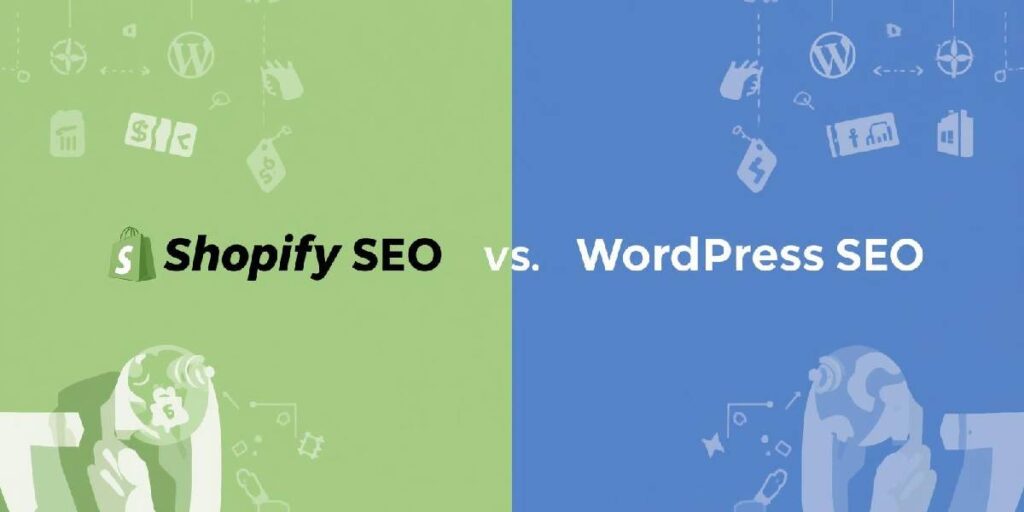
When Shopify Is a Better Choice
Shopify is ideal if you want to set up your store quickly without worrying about coding or maintenance. It’s an all-in-one platform where hosting, security, and payments are already built in. Everything is streamlined, so you can focus on selling rather than technical setup.
It’s especially great for small to mid-sized e-commerce businesses or beginners who prefer simplicity and reliability. Shopify also handles updates and backups automatically, reducing the need for external tools or developers.
If you just want a smooth, hands-off experience, Shopify makes SEO and selling easier in one place.
When WordPress Is a Better Choice
WordPress (with WooCommerce) suits you if you want full control and flexibility. It’s open-source, meaning you can customise every aspect, from design to SEO structure, without limits. You can also install plugins to expand features as your site grows.
It’s perfect for content-heavy websites, blogs, or businesses needing advanced SEO tools and unique functionality. While WordPress requires more setup and maintenance, it rewards you with deeper control, ownership, and scalability.
If you want to shape your website exactly how you envision it, WordPress is the platform to go for.
And if you ever need expert help setting up your WordPress SEO the right way, the team at Cloudex Marketing can help you out 24/7.
Hybrid or Migration Considerations
Some businesses use both, running content on WordPress while managing sales on Shopify via integration. This hybrid setup works well when you want the best of both: Shopify’s checkout and WordPress’s blogging power.
If you’re thinking of migrating, consider your SEO equity and structure. Moving from WordPress to Shopify or vice versa can impact rankings if not handled carefully. Therefore, you should:
- Plan redirects
- Maintain your URLs
- Update metadata
If SEO and performance are your top priorities, you can contact our SEO team before migrating to keep your search visibility safe. We handle platform transitions with zero ranking loss and full technical precision.
Final Words & Recommendation
Both Shopify and WordPress have strong SEO potential – it’s not about which is “better,” but which fits you.
Shopify wins on simplicity, speed, and security, making it ideal for beginners or store owners who want an easy, maintenance-free setup. On the other hand, WordPress is built for flexibility, custom SEO strategies, and long-term scalability.
Shopify SEO vs WordPress SEO – Which One is Best For You?
If your business is product-focused and you want to launch fast → go with Shopify.
If it’s content-driven or you need complete control → WordPress is the smarter pick.
Budget and technical skills play a big role, too. Shopify handles things for you, while WordPress rewards hands-on users.
Looking ahead, SEO success will rely on content experience, AI integration, and performance adaptability across both platforms.
Stay tuned with the Cloudex Marketing Blog for upcoming insights on how SEO is evolving for e-commerce businesses in 2025 and beyond. Our experts regularly publish actionable SEO strategies to help you stay ahead of algorithm updates and digital trends.
Frequently Asked Questions About Shopify SEO vs WordPress SEO
Here are some of the most common questions people ask about Shopify SEO vs WordPress SEO.
Is WordPress better than Shopify for SEO?
WordPress is seen as better for SEO because it gives you full control, from editing meta tags and permalinks to customizing technical aspects of your site. You can also use advanced plugins like Yoast or RankMath. At the same time, Shopify simplifies the process and still performs well, especially for e-commerce brands that don’t need deep technical customization, however, the customizations are limited.
Is SEO worth it on Shopify?
Yes, Shopify SEO is absolutely worth it. It includes many built-in features such as optimized site structure, mobile responsiveness, and SSL security, all crucial ranking factors. You can further boost SEO with dedicated apps and by optimizing your product descriptions, titles, and images. Even without technical knowledge, Shopify users can achieve strong organic visibility with the right strategy.
Which eCommerce platform has the best SEO?
It depends on your needs. WordPress provides more flexibility, technical depth, and control, making it ideal for those who want to fine-tune every SEO detail. Shopify, on the other hand, is great for those who prefer simplicity and built-in optimization. Both platforms can rank well on Google if the site is optimized with quality content, structure, and consistent updates.
Is SEO better on WordPress?
Yes, WordPress gives you greater SEO control. You can optimize every technical aspect, add structured data, use advanced plugins, and modify code directly. Shopify limits certain areas like URL structure and server access, but it’s still powerful for SEO if managed properly. For businesses that prioritize content-driven strategies, WordPress often gives more long-term flexibility and results.
Can I migrate SEO when moving platforms?
Yes, SEO migration is possible, but it must be done carefully. You can transfer meta titles, descriptions, redirects, and backlinks. However, mistakes like missing redirects or broken URLs can harm rankings. Before migrating from Shopify to WordPress or vice versa, make a detailed plan or get professional help to avoid losing search visibility and traffic.
Which platform is better for blogging + store?
WordPress leads the way when it comes to blogging and content marketing. It was originally built as a blogging CMS, so it’s perfect for SEO-rich articles and long-form content. Shopify does offer a blogging feature, but it’s limited in customization; therefore, it is best for store management. If your business depends on both content and sales, WordPress with WooCommerce provides a balanced setup.
Does the platform determine success?
Not really. Your platform helps, but success depends far more on your strategy, content quality, and user experience. A well-optimized Shopify store can outperform a poorly maintained WordPress site, and vice versa. What matters most is consistent SEO work, keyword optimization, backlinks, speed, and great content that serves your audience.
Can Shopify match WordPress SEO with apps?
Shopify can get close. Using apps like SEO Manager, Plug in SEO, or Smart SEO, you can manage most on-page optimizations easily. However, WordPress still has an edge with deeper customization and plugin flexibility. For most businesses, Shopify’s app ecosystem provides enough SEO tools to compete strongly without needing technical skills.



